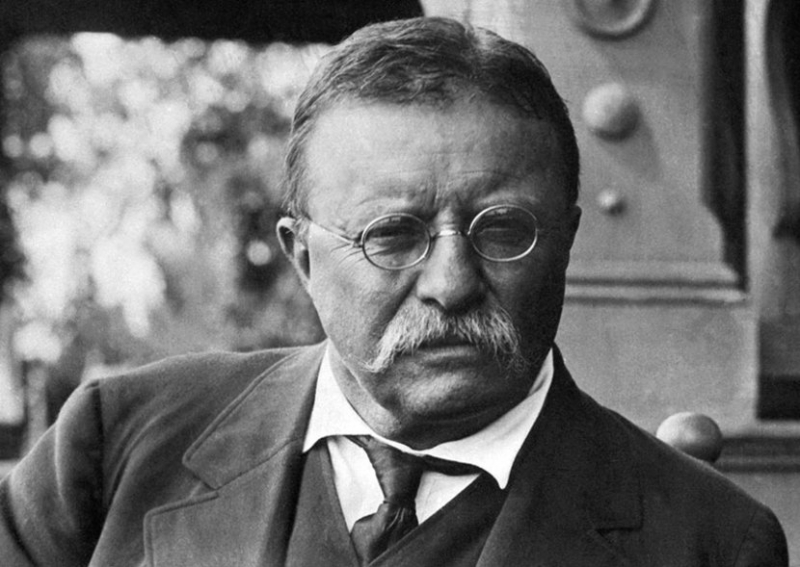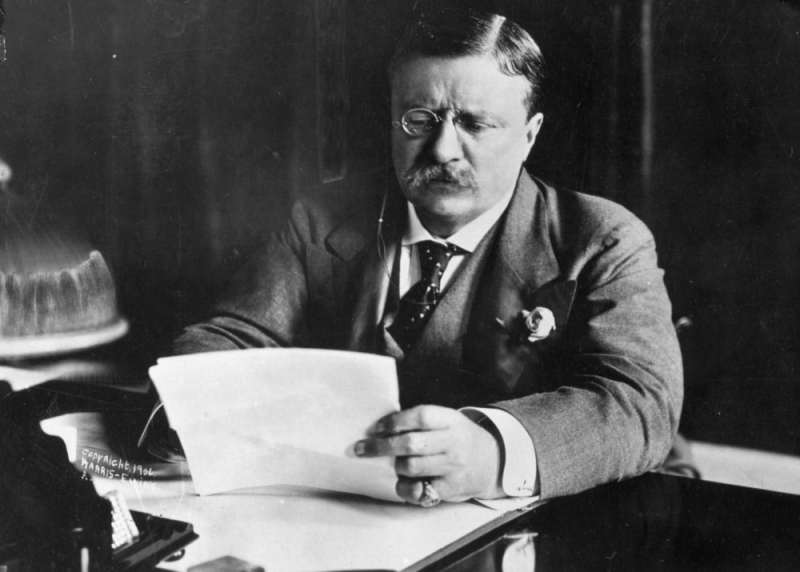Theodore Roosevelt

From 1901 to 1909, Theodore Roosevelt served as the 26th President of the United States. He was a leading character of the Progressive Era, helping to reform big businesses' abuses and corruption while also supporting liberal reforms.
Roosevelt had a remarkable personality; he loved the outdoors, was an excellent hunter, and campaigned to establish the first American National Parks. He was also a writer, having written several volumes on military history. In 1906, he received the Nobel Peace Prize for his effective efforts to stop the Japanese-Russian war. At home, he built the US Navy and backed US participation in World War I.
Despite his youth, Roosevelt was elected as a Republican state assemblyman in New York, launching his political career. He established a name as an anti-corruption state assemblyman in New York, uncovering examples of corruption by wealthy persons and judges. This helped enhance his prominence, and by the 1884 Presidential Campaign, he was a state Republican party leader. He temporarily resigned from politics and relocated to a ranch in Medora, North Dakota, after his reforming candidate lost the nomination to James G. Blaine and the shock of family members passing away.
William Lafayette Strong appointed him to the board of the New York City Police Commissioners in 1895. Roosevelt launched his characteristically lofty reforms to root out corruption and promote officers based on merit rather than party affiliation. Roosevelt took his position seriously, having been stirred by a book on New York's crime-ridden districts written by writer Jacob Riis. Roosevelt took a special interest in these crime-ridden neighborhoods and worked to change the way the law was applied. He would even roam the streets late at night to ensure that police officers were carrying out their jobs. His reforms sparked a feud with Tammany Hall, and the police commissioners were eventually legislated out of existence.
Following the presidential election of 1896, Republican President William McKinley appointed Roosevelt to the position of assistant secretary of the Navy. In actuality, Roosevelt served as the true Secretary of the Navy since he was far more energetic and dynamic than his official boss. In 1898, Roosevelt was influential in mobilizing the navy to battle the Spanish navy, which was then stationed in Cuba. Roosevelt was a stronger supporter of war than McKinley. Roosevelt supported the Monroe concept and wanted Europeans expelled from the Americas. When war broke out, Roosevelt quit his position so that he could sign up for active duty, forming the First United States Volunteer Cavalry Regiment. This newly established regiment, known as the Rough Riders, was made up of a varied group of volunteers. Roosevelt used his national guard experience to teach his men basic military techniques. Roosevelt led his men on a mission to conquer Kettle Hill on July 1, 1898. He was the only man with a horse and rode between gun positions often. Despite advancing over open land, the campaign was a success, and the regiment captured the post. Later, he described it as "the greatest day of my life."
Roosevelt was narrowly elected governor of New York in 1898. He used his position to push for more regulation of businesses, particularly those that benefited from a state franchise. Roosevelt enacted the Ford Franchise-Tax Act, which taxed these state-supported businesses. He successfully straddled the line between free-market capitalism and socialist radicalism. Roosevelt's political clout earned him the position of Vice President under President McKinley in 1900. Despite their differences, McKinley hoped Roosevelt would help him win the popular vote. Roosevelt's boundless energy and fervent campaigning aided the Republicans' triumph. He also ran on his military background and advocated for the annexation of the Philippines.
President McKinley was shot by a lone anarchist in September 1901 and died as a result of his injuries. It meant that Roosevelt became President only a few months into the Presidential campaign. As President, Roosevelt was more vocal in his support for the regulation of major corporations (Trusts) that were thought to be abusing their monopoly status. He took 44 trusts with him, including the highly significant probe of John D. Rockefeller's Standard Oil.
In 1902, he also backed the establishment of the United States Departments of Commerce and Labor. After a coal strike erupted in May 1902, Roosevelt personally intervened to mediate a settlement. Both parties made compromises, including modest wage increases for workers. Roosevelt declared that he desired a "square bargain" with both labor and capital. He became more radical toward the conclusion of his reign, proposing a progressive income tax, a tax on inherited wealth, and plans for establishing a welfare state.
Roosevelt was also involved in other activities. He supervised railroads, probed corruption, and negotiated new agreements to make harmful chemicals in food illegal. Roosevelt was one of his generation's most activist presidents. His desire for reform and regulation extended to a wide range of issues, albeit Congress did not always back him up, particularly during his second term. He issued almost 1,000 executive orders, setting a new record. Following the Financial Crisis in 1907, Congress had become increasingly rebellious, with conservative Republicans vetoing the president's ideas.
Roosevelt oversaw a period of mass immigration. He reorganized the federal immigration depot at Ellis Island, where millions of people were processed. He was a firm believer in immigrant Americanization. He assumed that immigrants would only revere the American flag. In the First World War, he was critical of Irish and German immigrants for their antagonistic attitude toward the Allies. In terms of race, Roosevelt appointed some African Americans to federal positions but did nothing to alter entrenched southern policies. He considered slavery to be a major sin. When it came to race, Roosevelt saw America's mixed-racial society as a difficulty, yet he campaigned for equal treatment in typical form. However, near the conclusion of his presidency, he exacerbated racial tensions by crusading against 'race suicide' - Roosevelt was concerned about low birth rates among white voters, which resulted in a reduction in the white percentage of the US population.
During his presidency, Roosevelt implemented a number of conservation programs. He established five new national parks as well as 18 new national monuments. He also established numerous additional places of preservation, ranging from forests to game reserves. He regarded it as one of his greatest legacies as a great outdoorsman.
As president, Roosevelt worked to strengthen the United States Navy. Despite his public support for the annexation of the Philippines, he lost interest in Asia. Perhaps his most major project was the Panama Canal, which would be a vital commerce route for shipping products from the East Coast to the West Coast by ship rather than cross-country. Roosevelt was chastised for overpaying the Panama Canal Company.
Roosevelt had tremendous success as an international mediator in foreign policy. He was instrumental in reaching a resolution to the Russian-Japanese war. In 1906, he received the Nobel Peace Prize for his efforts. Under Roosevelt, ties with the United Kingdom improved dramatically, removing any remaining grounds of contention dating back to the American Revolution. From 1902-03, Roosevelt was crucial in bringing European nations and Venezuela to the Hague for arbitration.
Roosevelt is credited with transforming American political life and introducing liberal reforms that counterbalanced monopoly trust power. In 1927, he was honored with George Washington, Thomas Jefferson, and Abraham Lincoln at Mount Rushmore.


























